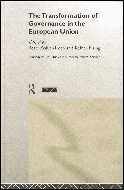| Go to | ||
|
|
||
Abstract
Governance is the new buzzword to capture policy making in
inter-locking systems. This book offers both: On the one hand, it
conceptualises this theoretical approach to the evolution of a Euro-specific
type of governance and its dissemination into member-state systems. On the
other hand, empirical analyses investigate the evolution and transformation of
governing patterns in different policy settings and member states.
Contents
| Part I: The conceptual challenge of European governance |
||
| Introduction: network governance in the European Union | Rainer Eising, Beate Kohler-Koch | |
| The evolution and transformation of European governance | Beate Kohler-Koch | |
| Part II The transformation of European governance: variations on a theme |
||
| Transformation in European environmental governance | Andrea Lenschow | |
| Regulating genetic engineering in the European Union: a post-structuralist perspective | Herbert Gottweis | |
|
European social policy: towards multi-level and multi-actor governance |
Gerda Falkner | |
| Economic and monetary Union in Europe: a transformation of governance | Kenneth Dyson | |
| Planes, trains, and automobiles: transport governance in the European Union | Mark Aspinwall | |
| Governance transformation in the professional services sector: a case of market integration 'by the back door'? | Jill Lovecy | |
| Part III The European Union and the transformation of national patterns of governance |
||
| National patterns of governance under siège: the impact of European integration | Vivien Schmidt | |
| Business, governance structures and the EU: the case of Denmark | Niels Chr. Sidenius | |
| Perceptions of governance in Greek state retreat: implementing policy change against policy-making persistence | George Pagoulatos | |
| Reshuffling power: the liberalisation of the EU electricity markets and its impact on the German governance regime | Rainer Eising | |
| Part IV Theoretical, normative and comparative perspectives on European Governance |
||
| Defending state autonomy: intergovernmental governance in the European Union | Klaus-Dieter Wolf | |
| Government, governance, governmentality: understanding the EU as a project of universalism | Thomas O. Hueglin | |
| Governance in the European Union: a comparative assessment | Rainer Eising, Beate Kohler-Koch |
Contributors
Mark Aspinwall is Lecturer in Politics at the University of Durham, United Kingdom.
Kenneth Dyson is Professeor of European Studies at the University of Bradford, United Kingdom.
Rainer Eising teaches International Relations at the University of Mannheim, Germany.
Gerda Falkner is Associate Professor at the Institute for Government and Political Science, University of Vienna, Austria.
Andrea Lenschow is Lecturer at the Institute for Political Science, University of Salzburg, Austria.
Herbert Gottweis is Professor of Political Science at the University of Vienna, Austria.
Thomas Hueglin is Professor for Political Theory and Comparative Politics at the Wilfrid Laurier University, Waterloo, Canada.
Beate Kohler-Koch is Professor for Political Science at the University of Mannheim, Germany.
Jill Lovecy is Lecturer in the Department of Government of the University Of Manchester, United Kingdom.
Grorge Pagoulatos is visiting research fellow in the Hellenic Studies Program and South European Research Group, Department of Politics, Princeton University, USA.
Vivien Schmidt is Professor of International Relations at Boston University, USA.
Nils Christian Sidenius is associated Professor in Political Science at the University of Aarhus, Denmark.
Klaus Dieter Wolf is Professor of International Relations at the Technical University of Darmstadt, Germany.
